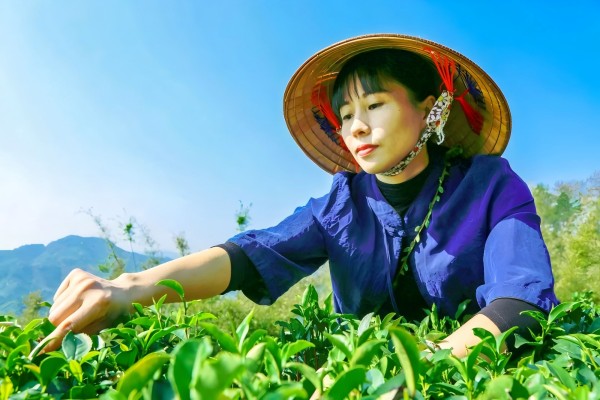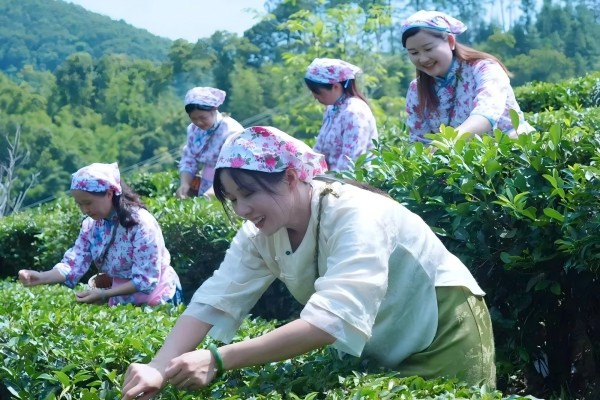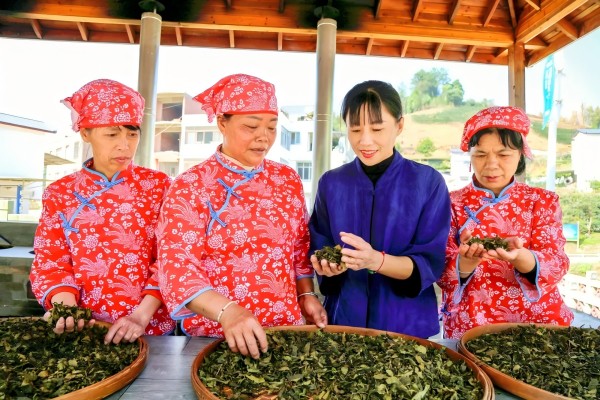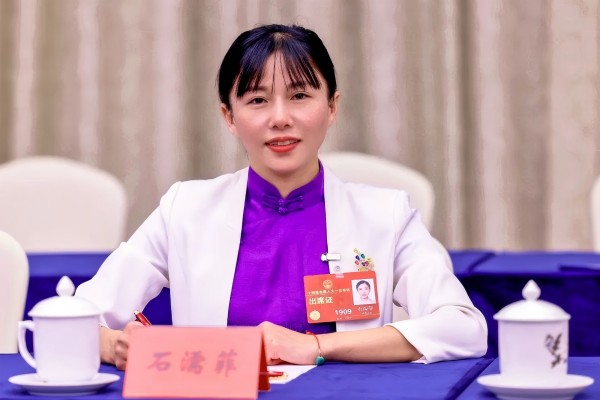NPC deputy drives rural vitalization in Guangxi through tea-making
In the tranquil mountains of Liubao township in Cangwu county, South China's Guangxi Zhuang autonomous region, where rivers meander gently through the verdant tea gardens, lies the birthplace of Liubao tea.
The tea, with a legacy spanning more than 1,500 years, once traveled along the ancient waterways to Guangzhou in South China's Guangdong province and via the Maritime Silk Road, reached Southeast Asia and beyond, gaining popularity among worldwide tea lovers.
Today, Shi Rufei, Party chief of Heishishan Tea Factory in Liubao township and a deputy to the National People's Congress (NPC), is devoted to reviving the Liubao tea business and sharing its story with the world while promoting the vitalization of local communities.
"To make Liubao tea business thrive, to share its story with a larger audience and to help tea farmers prosper, that's my greatest wish!" said Shi, 38, a native of Liubao township.

Shi Rufei, Party chief of Heishishan Tea Factory in Liubao township, Cangwu county in South China's Guangxi Zhuang autonomous region, and a deputy to the National People's Congress, works in her tea garden. [Photo provided to npc.gov.cn]
Growing up in a community steeped in tea culture, Shi learned tea picking and tea processing from her grandparents in her childhood. In 2007, Shi started to run the tea factory, vowing to preserve and promote the traditional tea-making techniques.

Shi Rufei picks tea leaves with her village fellows. [Photo provided to npc.gov.cn]
At that time, Liubao tea faced serious challenges. Inconsistent production techniques and low market recognition left many tea farmers struggling. "When I mentioned Liubao tea to outsiders, hardly anyone had ever heard of it, and many of our village tea gardens had been abandoned. I felt really disheartened," Shi recalled.
Determined to change the situation, she set out to not only introduce Liubao tea to a wider audience, but also pass down the traditional techniques that come with it.
The production of Liubao tea is a meticulous, 16-step process, done entirely by hand. From picking and withering to roasting, fermenting and aging, each step requires precision and skill.
To deepen her understanding of tea-making, Shi followed in her mother's footsteps, traversing every tea mountain and village in Liubao township. She studied the distinct soil types, climate and humidity patterns of each region, as well as the diverse tea-making techniques practiced by local communities.
Over the years, Shi has mastered every step of the tea-making process from cultivation, management, picking and processing, to brewing, tasting, packaging and storage. The independently developed products of her tea factory have also gained market recognition.
Her dedication paid off in 2015 when she was recognized as a representative inheritor of Liubao tea-making techniques, an intangible cultural heritage in Guangxi.
Shi's efforts have not only preserved tradition but also transformed the lives of local tea farmers. In recent years, Guangxi has prioritized the tea industry, propelling Liubao tea onto a fast track for growth. "A single tea leaf can bring wealth to the entire community," Shi said.

Shi Rufei shares her tea-making skills with fellow villagers. [Photo provided to npc.gov.cn]
Since 2009, Shi has organized training programs that have reached over 6,000 participants, teaching villagers every aspect of Liubao tea production—from planting and harvesting to processing and packaging. The programs have empowered them to produce high-quality tea that commands better market prices.
Through her tea factory, Shi collaborates with farmers and cooperatives, managing 12,000 mu (800 hectares) of tea gardens across Liubao's core production areas. Each year, her factory purchases over 150,000 kilograms of fresh tea leaves from tea farmers, benefiting more than 180 households, 80 of which are led by women. Thanks to the growing demand for Liubao tea, these farmers have seen their annual incomes increase by over 1,500 yuan ($205) per person.
As an NPC deputy, Shi said she feels a profound sense of responsibility to reflect the voices of her community. "If I only focus on my own success and fail to help others prosper or voice their concerns, I would feel unworthy of this honorable role," she said.
Now, Shi is striving to enhance the Liubao tea brand and expand its sales channels. With traditional tea-making techniques and associated social practices now inscribed onto UNESCO Representative List of the Intangible Cultural Heritage of Humanity, she is more determined than ever to elevate Liubao tea's global profile.
She envisions creating tea culture-themed national parks in key tea-producing regions to promote China's rich tea heritage and boost rural tourism. "Liubao tea is not just a product, it's a cultural treasure," Shi said, vowing to make further efforts to preserve the centuries-old tradition and brew a brighter future for her community.

Shi Rufei attends the first session of the 14th National People's Congress. [Photo provided to npc.gov.cn]
Feng Tian contributed to this story.
- Top legislature schedules session for December
- China's top legislator holds talks with president of Luxembourg parliament
- China's top legislator meets with French president
- China, Maldives pledge to enhance exchanges between legislative bodies
- Senior Chinese legislator meets Portugal's PSD delegation



